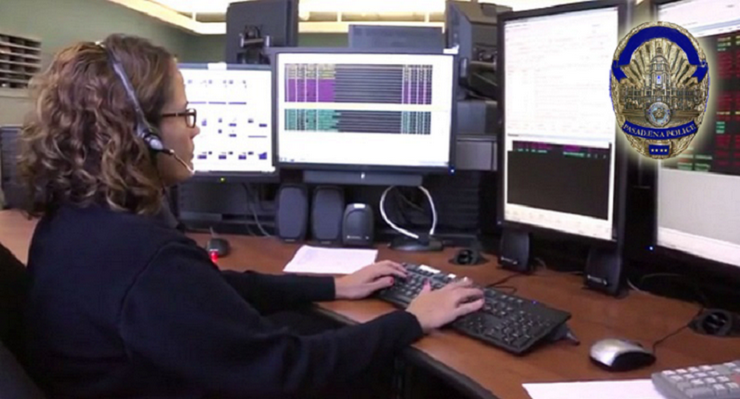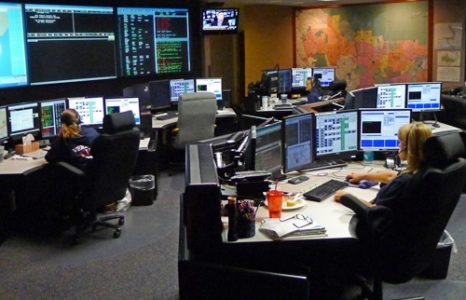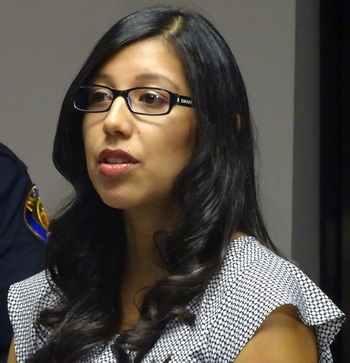
They are, in the words of Pasadena Police Lt. William Grisafe, “the first first-responders.”
Before police officers or firefighters or EMS workers arrive at some crime or crisis, dispatchers are already in gear…the first point of contact for the public, the first source of vital and often life-saving information for those racing to the scene or those waiting for help.
April 12-18 is National Public Safety Telecommunications Week, which honors these unsung, behind-the-scenes civilians who often are the ignition keys to public safety – and whose jobs require a grace under pressure the public might never realize or even think about.
“They play such an important role in how officers respond to calls for service,’’ said Grisafe. “It is so important that they get all the information that officers need for officer safety. Without their work, we’re essentially going blind into calls for service, which can be very dangerous to officers.

“They really are the scouts that go out ahead and get all the information for the officers. If you have a tactical operation or if you have a situation, you want to know the intelligence ahead of time. And our dispatch centers are the ones who gather that information for us.’’
Battalion Chief Phil Ambrose of the Verdugo Fire Communications Center – which dispatches fire and EMS calls for 13 San Gabriel Valley agencies, including Pasadena – said he was well aware of this week being a time when his dispatchers get a well-earned slice of the spotlight.
“I am aware, yes – although every day is dispatcher appreciation day for me,’’ Ambrose said.
These days, of course, amid the COVID-19 crisis, dispatchers face particular challenges, protecting first-responders from exposure to the coronavirus by getting early intel on the situations into which those first-responders are headed.
Nor can dispatchers work remotely in these days of “Safer at Home.” Because of the high-tech nature of their equipment, they need to report for duty at headquarters – with work stations spaced at least six feet apart, and cleaning protocols maintained.
“Right now, with the current situation, we’re screening the calls so that, as much as we can, we try to prevent (officers) from being exposed to COVID or anybody that could possibly have it,’’ said Rosanne Macias, a 21-year veteran dispatcher for the Pasadena PD and a supervisor since 2005.
“So, the dispatchers are asking whether or not (callers needing assistance) have traveled recently, been out of the country and whether or not they’re having any sort of flu-like symptoms. And we’re asking that of the person calling AND what they’re calling about.’’
Said Grisafe: “It’s the preliminary information that we rely on that really starts the calls for service, and what starts the approach in which officers are going to respond to a call.’’
Make no mistake – it’s a big job with a heavy workload.
According to Macias, Pasadena police dispatchers fielded 225,474 calls in 2019, including 61,779 emergency calls to 9-1-1. That’s with a staff that, at most, has five dispatchers and one supervisor manning the headsets on any given shift. In all, the PPD has 25 dispatchers and three supervisors on staff.
On the fire and EMS side, the Verdugo Fire Communication Center took 177,068 calls last year, regarding 84,708 incidents, according to Anita Shandi, deputy director of fire administration and public information officer for the Glendale FD. The difference in those numbers comes from the fact that, often, there will be multiple calls about a single incident.
VFCC uses a “no borders, unified response” model in which any of its 13 agencies can be dispatched anywhere within those 13 jurisdictions (including the Hollywood Burbank Airport.)
According to Jason Pfau, an information-services specialist with the Glendale FD and the VFCC, “We dispatched Pasadena Fire Department 15,590 (times) for EMS, 3,854 for fires, 733 for service and 49 for other reasons in 2019.’’
In all, said Ambrose, the VFCC dispatches between 170 and 300 responses a day, ranging from fires big and small to medical emergencies to cats stuck up trees.
And, like the Pasadena Police Department, the VFCC typically has five dispatchers on duty to handle all that on any given shift. There is very little downtime for dispatchers.
“The one thing unique about a 9-1-1 dispatcher is, as the calls come in, we can’t put people on hold – they’re kept to a very high standard, which means answering the phone within 15 seconds and getting that dispatch out immediately,’’ said Ambrose.
“Whether you need to use the restroom or take a break and eat – there is oftentimes no stoppage between the calls.’’
VFCC dispatchers will also, sometimes, have to stay on the phone with a caller and instruct that caller on the basics of CPR. That’s pressure on both ends of the conversation.
“In cardiac-arrest survival rates is, it’s more important for CPR to be done even before the paramedics get there,’’ Ambrose said. “Our dispatchers are trained to immediately ascertain whether or not the person is breathing, and then assist the person calling through CPR — because even if we can get marginal CPR started, meaning somebody that’s never even done it, if we can get that started early, the survival outcomes are greatly improved.
“So that’s something to point out as far as where the pressure can come into the job.’’
What’s more, Ambrose said, dispatchers often have to extract vital information from a panicked caller.
“The callers, some are very calm, others are hysterical,’’ he said. “If somebody’s standing there with their child that’s not breathing, you would expect that they’re not exactly going to be calm, cool and collected. So the dispatcher’s job really is difficult, because they can’t get too emotionally involved in that call — but it’s hard not to.
“And they have to make sure they get that information out of the person … so they can send the appropriate resources and send them to the right place.’’

Around the Pasadena Police Department, one mighty instance of grace under pressure from dispatchers occurred on July 12, 2014 – a date that’s still recalled among officers and dispatchers alike. That was the day a gunman with a high-powered rifle killed three and wounded two before barricading himself in a Summit Avenue house and firing on officers.
The shooter called 9-1-1 and then spent 25 minutes on the phone with a dispatcher – who eventually convinced him to surrender.
“Had it not been for our dispatchers, and their abilities to talk him into surrendering, that would have been a very prolonged incident that had danger to officers, community members and himself,’’ said Grisafe.
That hero dispatcher, Diane Marin, no longer works for the Pasadena police, but another dispatcher who handled radio communications to officers at the scene that day still has vivid memories of a very emotional shift from nearly six years ago.
“We had an officer go on scene and unfortunately was caught in the fire, so all I could think of was getting him home,’’ said Alexis Bartoli, who’s now a Pasadena police dispatch supervisor.
“He was a veteran and had two kids at home, so that’s really what I could think about – how they’re going to get him out after the shooter started shooting at him. It was difficult, because the other dispatcher could hear the shooting happen in the phone.’’
Luckily, that officer escaped the scary scene unhurt.
“We were able to do an emergency rescue with our SWAT (team) and get him out without any injuries,’’ Bartoli recalled.
She remembers having to keep her own emotions in check as the drama played out.
“It was up to me to kind’ve keep a low voice and tell the officers in the field what we were hearing on the phone, because the officer that was on scene couldn’t get to his radio, he was trying to find cover,’’ she said.
The incident haunted Bartoli in the immediate aftermath … but ultimately convinced her she could handle the heat and keep a cool head.
“Once it was over, it took me a couple of days to come down from that,’’ Bartoli recalled. “I had a hard time sleeping for about a week. I couldn’t eat or anything like that, because the adrenaline rush was so high, and there’s really no way to kind’ve come down from that quickly.’’
Bartoli was a rookie dispatcher back then – it was only her third day of working without a training officer at her side.
“In the end … it kind’ve set up my career for me to be pretty confident in what I’m doing and kind’ve love this job even more,’’ she said. “Because I hope that we were able to make it so a lot more people went home versus those few victims that we had, unfortunately.’’
Ironically – many would say, unfairly – these “first first-responders” are not technically classified as first responders at all. Rather, dispatchers are categorized by the federal government as “administrative” workers.
But a state Assembly bill, AB 1945, sponsored this January by Assembly Member Rudy Salas (D-Bakersfield) is looking to change that in California.
“(The administrative) classification does not accurately describe the work of dispatchers who undergo extensive training and whose work can mean the difference between life and death,’’ Salas’s office said in a January news release.
AB 1945, Salas added, would “ensure that brave women and men who are working as dispatchers are properly acknowledged for their work.’’
Ambrose, meanwhile, said that during this National Public Safety Telecommunications Week – and the other 51 weeks as well – people should never forget the stress, emotions and commitment routinely demonstrated by dispatchers.
“Anybody that’s worked around a dispatch center realizes that, no, a dispatcher isn’t there touching a patient with COVID, but they are dealing with the pressure and the stress of every one of these calls – sometimes almost more significantly because there’s such a lack of closure,’’ he said.
“When you’re dispatching for 13 cities, you might not find out the outcomes of particular calls, and you’re only remembering the screams of the people calling and asking, hey, when are they coming, why aren’t they here yet?
“(The dispatcher’s job),’’ he added, “is not just pointing and clicking and sending a rig. It’s a lot more than that.’’


















